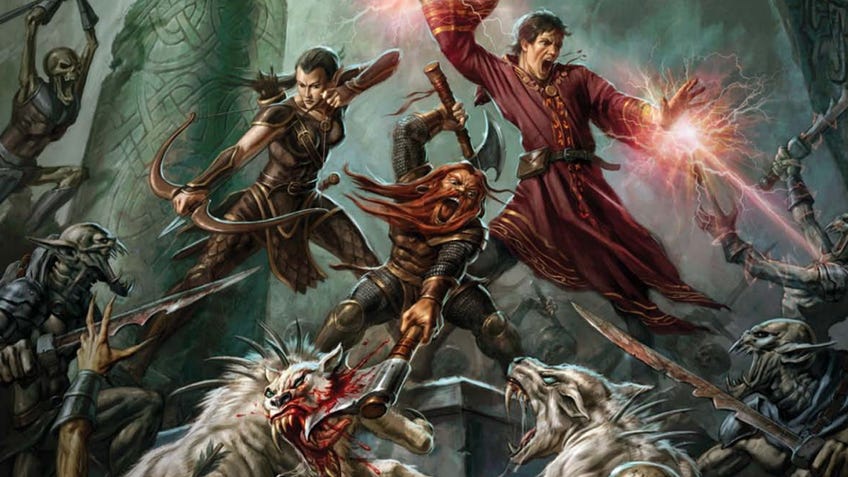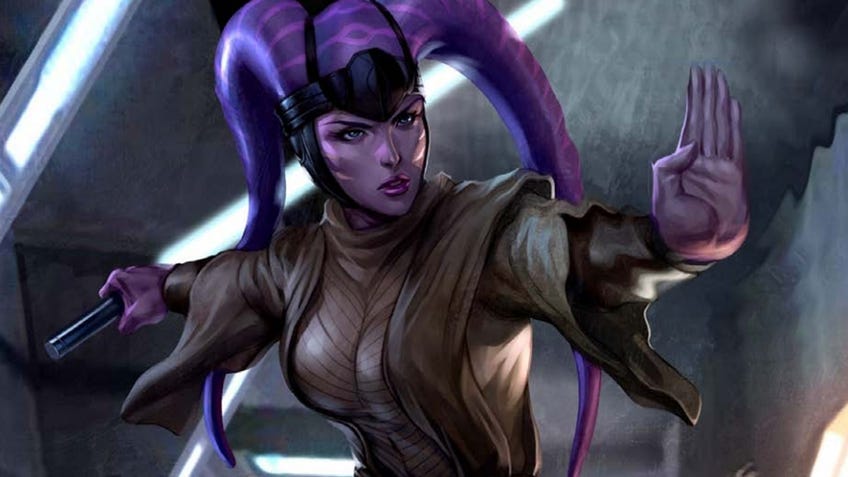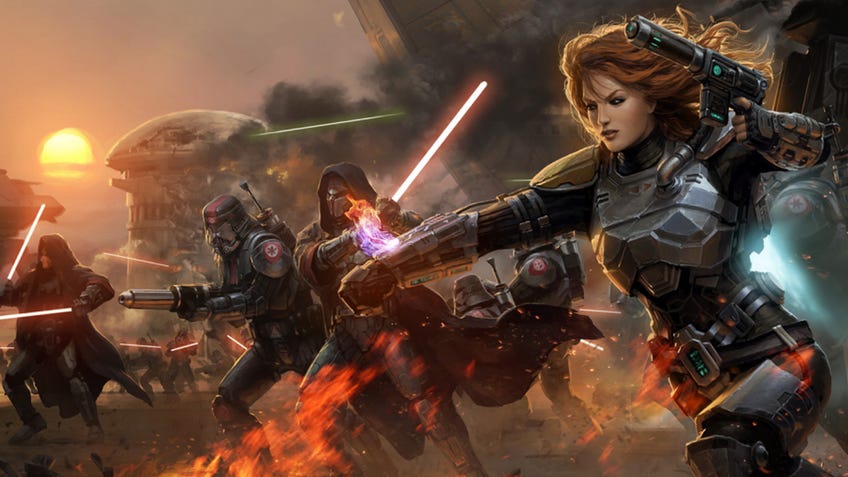From Star Wars to Stranger Things, tabletop RPGs are letting fans explore and expand the pop culture worlds they love
Fan power.
When you love something, it’s only natural to want more of it. Some of us love Star Wars for example - yes, even Rise of Skywalker - while others can’t help but want more of Stranger Things. The only natural solution is, of course, to find a way to have even more of these things that we love so much. Roleplaying in familiar worlds is an excellent way to do just that.
There are a lot of great tabletop RPGs willing to let you further explore the universe you crave. There are Star Wars, Stranger Things, Lord of the Rings and even Rick and Morty roleplaying games. These are games that bring fans together to experience more of the worlds, stories and characters they enjoy in mediums such as video games, books and films, but there are more prominent reasons for venturing into familiar worlds on the tabletop beyond people having something in common with one another.
“GM-wise, what I always liked about creating a story in Star Wars [RPG] is how it let people play someone they’d yet to see in the movies,” says Oliver Bishop, a player of Star Wars Roleplaying Game: Revised, Expanded and Updated, the fan-made successor to the original West End Games RPG. “The movies are improving as the years go on, but there’s still so much left to cover. When Rose was revealed and was shown to have such an important role in The Last Jedi, that meant a lot to me. But to play as a character like Rose, a major protagonist who’s Asian and be a lead was euphoric. I’d never been able to see that before in Star Wars.”
Roleplaying is a great way to right the wrongs in the original.
The team behind REUP were keen to improve and make Star Wars more accessible than ever by reworking the Star Wars Roleplaying Game into an experience that values fun over rules. While the updated game does evolve the d6 gameplay system - untouched since West End Games’ second edition in 1997 - REUP’s designers kept most of the original rules the same. They released the RPG digitally to give players easier access and help create their own narratives in the Star Wars universe, without relying on a complicated rule system or the series’ defined canon.
Canon is a term used to differentiate between what’s set in stone by the original creators - such as Lando Calrissian being the original owner of the Millenium Falcon - and what’s adopted by others as so-called ‘fanon’: things that aren’t officially confirmed but are often agreed by a subsection of the medium’s community. These can be things such as Luke Skywalker being a lover of all things blue milk, or Luke, Leia and Han suffering from PTSD after the events of the original Star Wars trilogy. In a tabletop RPG set in an existing universe, established canon is often twisted by both GMs and players in ways that, ultimately, makes the experience more fun for the players.
“It’s a great way to right the wrongs in the original,” says Jaya Bagla, a player in my own Dragon Age campaign. In the case of Dragon Age, characters who can die as the result of player choices in the video games can be kept alive on the tabletop. “Like, why do I need to choose between sacrificing Hawke or Stroud? In these kind of games, you can hand-wave it aside and create your own.”

Whether correcting the whole ‘Who shot first?’ argument in Star Wars or even changing who triumphed in The Lord of the Rings, tabletop RPGs can provide ample room to play out ‘what if’ scenarios. After all, maybe a near-apocalyptic Middle-earth setting under the rule of Sauron would make for a more interesting setting than the utopian outcome of Return of the King.
Tabletop rules can add other new, exciting twists to a universe you already know intimately. Star Wars roleplaying fan Zaranell observes that while Star Wars’ Stormtroopers are usually portrayed as ‘one-shot’ enemies, they - like almost every enemy in Fantasy Flight Games’ Star Wars RPGs - are given hit points. This changes the stereotype of Stormtroopers almost immediately. While ten hit points isn’t a lot, the inclusion of them already makes the universe of Star Wars seem more dangerous than before and encourages a tactical mindset that isn’t often shown outside of dogfights in space. Zaranell mentions how these rules are used to incorporate bigger characters from the movies, such as Captain Phasma and Darth Maul.
“If a more significant enemy gets to zero health, they don't die immediately. Each hit they take after that, however, incurs wounds that cripple them more and more, with dice rolls determining how quickly they die.”
Longevity is a feature of the medium and a great way of doing fan fiction with your friends.
For Star Wars, this is particularly interesting. When characters get shot or near-burnt to death in lava in the films, it always seems instant. In Fantasy Flight’s Star Wars RPG, villains are more powerful than ever - with a single opponent usually being enough of a fight for a group of adventurers. It makes the universe feel much more brutal than what we’re normally shown on screen, and introduces mechanics that can make characters feel larger than life.
Of course, there are some limits to these rules. As Zaranell points out: “Star Wars is a franchise about fun adventures, and nitty gritty logistics and details are less important than making a fun story of action and drama.”
For other players, longevity is a key part in what’s so appealing to them about tabletop roleplaying games set in universes like Star Wars and The Lord of the Rings. As a GM for the Dragon Age RPG by Green Ronin, which unfortunately only has a small handful of adventures, it falls on my shoulders the majority of the time to delve the depths of Dragon Age lore and create campaigns entirely from scratch instead of relying solely on the video games, books and comics - all of which only go up to the time of 2014 video game Dragon Age: Inquisition. In my own experience, creating a universe past that endpoint was a more intricate way to explore the world of Dragon Age and help me get a deeper understanding of worldbuilding.

It’s been six years since Inquisition, the last main addition to the Dragon Age series, was released. While the video games are replayable, players are often left to fill in the blanks when it comes to other aspects. Kelly Richards, a player in my campaign, says that while they “loved the Dragon Age games,” it was hard to absorb the fantasy world in the video games of Dragon Age due to being more focused on actual gameplay and the overarching plot. While there is a codex involved in the video game, Richards said she felt no real desire to read it, as the information in there rarely felt connected to her character. With the tabletop roleplaying game, she learned more about elements of the world. The Dragon Age tabletop RPG kept the world fresh so, as Richards puts it, she no longer has to “constantly wait for updates for Dragon Age 4”.
Jasmin Neitzel, editor and developer for World of Darkness tabletop RPGs such as Vampire: The Masquerade and Werewolf: The Apocalypse, agrees that longevity draws fans to tabletop RPGs with an existing world: “[Longevity] is a feature of the medium and a great way of doing fan fiction with your friends.”
A tabletop RPG can also help an existing world grow to include important and meaningful aspects that were missing in the original depiction of the setting. With the game world and its inhabitants controlled by the GM and players, the narrative is able to go into more exciting, diverse directions and offer more powerful, personal stories.
“It lets people be who they want to be and see who they haven’t had a chance to see because, as you probably already noticed, there aren’t a lot of gay characters in Star Wars.” Bishop says of Star Wars RPG: REUP.
Roleplaying lets people be who they want to be and see who they haven’t had a chance to see.
Neitzel adds that it isn’t as simple as wanting to create a tabletop character the player can relate to, as most tabletop RPGs allow: “Even if the characters are not like themselves, there are still stories and character types that resonate. Despite being a trans woman I can enjoy Indiana Jones’ roguish charm or relate to Leia Organa as a woman doing badass things on screen. Samwise Gamgee’s loyalty and friendship resonates despite his gender or ethnicity.”
Neitzel observes that being given space in a familiar universe to simply exist is powerful in its own right: “It is easier to be invited if our presence is not a homebrew.”
Tabletop roleplaying games aren’t just a way for fans to explore a world they know beyond the boundaries of page or screen, but an opportunity to build new things and contribute to the stories they love. Players are able to shape something beautiful in a world they want to spend more time in, and share that passion with others.

